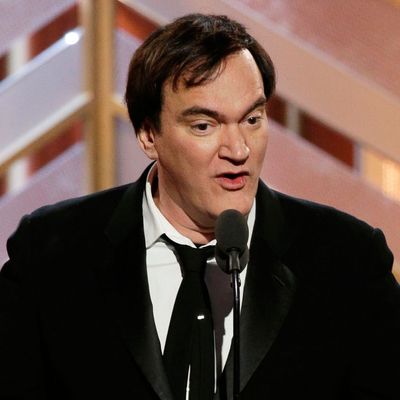
Quentin Tarantino upset some people at last night’s Golden Globes. After Jamie Foxx and Lily James announced that Tarantino’s film The Hateful Eight had won the award for Best Original Score, Tarantino came up onstage and began singing the praises of Ennio Morricone, the Italian composer who had scored the film:
Wow. This is really cool. Do you realize that Ennio Morricone, who as far as I am concerned is my favorite composer — and when I say favorite composer, I don’t mean movie composer — that ghetto — I’m talking about Mozart, I’m talking about Beethoven, I’m talking about Schubert, that’s who I’m talking about. And Ennio Morricone has never won an award for any one individual movie that he has done. He has in Italy — but not in America… [emphasis his]
When Foxx got back up onstage after Tarantino’s speech, he flashed a mischievous smile and said a single word — ghetto — before moving on with the proceedings. As Salon reports, a wave of Twitter opprobrium followed:
It wasn’t just random tweeps. Refinery29 even thanked Foxx for his valuable work as a social-justice watchdog:
The natural thing to do when there’s debate about whether a word is being used appropriately is to look to the dictionary. Let’s do that here. Here’s one definition from Merriam-Webster:
a : an isolated group
b : a situation that resembles a ghetto especially in conferring inferior status or limiting opportunity
And here’s one from the Oxford English Dictionary:
An isolated or segregated group or area:
‘the relative security of the gay ghetto’
Tarantino, in other words, used the word exactly as it’s defined in the dictionary, since both dictionaries — dictionaries not, on the whole, being particularly freewheeling when it comes to creative use of language — assert that in the English language, ghetto is used in multiple senses and doesn’t have to refer to a specific physical location inhabited by a specific group, nor only to oppression in its most extreme, systemic form. His style of usage might not be as common as others, but it isn’t exactly rare: Talk to academics long enough and you’ll often hear them refer to certain disciplines as being “ghettos,” in that they don’t receive enough funding or respect as compared to others.
Scott Timberg, the author of the Salon article, has no interest in such pedantry: “‘[G]hetto,’ no matter how Tarantino might have intended it, is a racially-charged term, and Tarantino has unleashed something online.” This is an extremely useful and illuminative sentence: It implies that it doesn’t matter whether what Tarantino said can reasonably or fairly be described as offensive; what matters is that there exists a controversy about it (a controversy that outlets like Salon are naturally going to help spread). Also, the term is racially charged and therefore, it can safely be implied given the context, shouldn’t be used to describe anything that doesn’t involve African-Americans or other darker-skinned people.
If this is now a Rule of the English Language, it would be news to a lot of people — including Salon writers. Over the years, articles appearing there have worried about or noted the “ghettoization” of “women’s issues,” “certain types of coverage,” and overweight dating-show participants. Plus, if we adopt this troubling-for-various-reasons standard that every word can only mean one thing, it’s actually references to black ghettos that are offensive. As Merriam-Webster notes, ghetto originally referred to “the Jewish quarter in a city.” Among historians who study European anti-Semitism, that’s the much more salient definition (I know one sociologist who is working on a book about the history of the concept of the ghetto, including its original incarnations in Europe — hopefully his publicist knows not to send a copy to Salon).
Now, language shifts over time. Today, ghetto is used in multiple ways to refer to multiple sorts of situations. Maybe 20 years from now, things will be different: There will be a burgeoning consensus that the only appropriate use of ghetto is in reference to a poor and neglected African-American neighborhood, that the part of Warsaw to which Jews were restricted should be called something else, and that the Salon writers who carelessly threw around the term ghettoize back in the early 21st century were monsters from a less informed time.
But for now we’re nowhere close to that point. And in working through the sometimes complex questions of what is and isn’t offensive, it might be useful to adopt what feels like a pretty reasonable heuristic: If someone uses a word exactly as it appears in a dictionary entry, they get a green light.





























